VW Tiguan vs BMW X3 – Technische Daten, Verbrauch & Preise im Vergleich
Welches Modell überzeugt mehr – der VW Tiguan oder der BMW X3?
Wir vergleichen für dich Leistung (272 PS vs 398 PS), Kofferraumvolumen (652 L vs 570 L), Verbrauch (0.40 L vs 0.90 L) und natürlich den Preis (36900 Fr. vs 57600 Fr.).
Finde jetzt heraus, welches Auto besser zu dir passt!
Der VW Tiguan (SUV) wird mit einem Benzin MHEV, Plugin Hybrid, Diesel oder Benzin-Motor angetrieben und ist mit einem Automatik Getriebe ausgestattet. Im Vergleich dazu hat der BMW X3 (SUV) einen Benzin MHEV, Diesel MHEV oder Plugin Hybrid-Motor und ein Automatik Getriebe.
In Sachen Kofferraumvolumen bietet dir der 652 L beim VW Tiguan bzw. 570 L beim BMW X3 ausreichend Platz – je nachdem, worauf du Wert legst. Wer mehr Leistung sucht, muss wählen ob die 272 PS des VW Tiguan oder die 398 PS des BMW X3 für die eigenen Bedürfnisse genügen.
Auch beim Verbrauch unterscheiden sich die beiden Modelle: 0.40 L vs 0.90 L. Preislich liegt der VW Tiguan bei 36900 Fr., während der BMW X3 bei 57600 Fr. zu haben ist.
Vergleiche alle Daten direkt und finde heraus, welches Modell zu deinem Lifestyle passt!
When comparing the BMW X3 and the VW Tiguan, it becomes clear that both vehicles cater to distinct preferences in the compact SUV segment. The X3 impresses with its sporty performance and premium interiors, while the Tiguan offers excellent practicality and innovative tech features at a more approachable price point. Ultimately, your choice may hinge on whether you prioritize driving dynamics and luxury or space and value for money.
VW Tiguan
The VW Tiguan presents itself as a versatile and practical option in the SUV market, combining a stylish design with a spacious and comfortable interior. It offers a smooth driving experience, making it well-suited for both urban environments and longer journeys. With its focus on safety and innovative technology features, the Tiguan remains a compelling choice for families and adventurers alike.
Details @ Volkswagen
@ Volkswagen
 @ Volkswagen
@ Volkswagen
 @ Volkswagen
@ Volkswagen
 @ Volkswagen
@ Volkswagen
 @ Volkswagen
@ Volkswagen
 @ Volkswagen
@ Volkswagen
BMW X3
The BMW X3 stands out in the competitive SUV market with its refined blend of performance and luxury. Its interior boasts high-quality materials and a design focused on driver comfort and convenience. With a robust engine lineup, the vehicle offers a balanced driving experience that caters to both urban settings and off-road adventures.
Details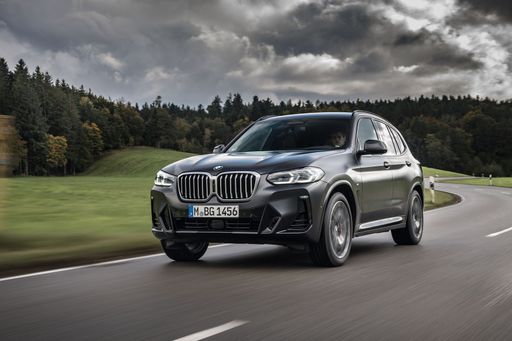 @ press.bmwgroup.com
@ press.bmwgroup.com
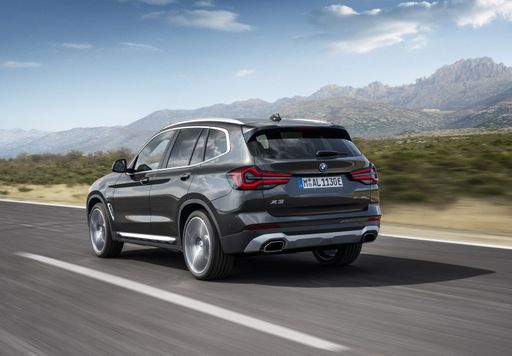 @ press.bmwgroup.com
@ press.bmwgroup.com
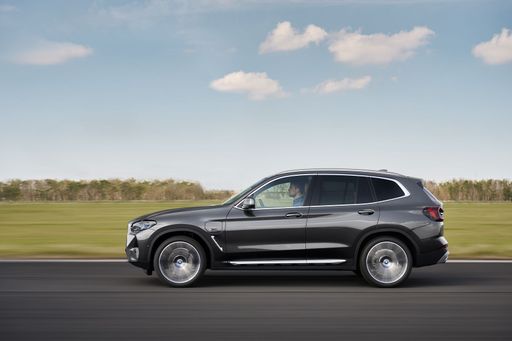 @ press.bmwgroup.com
@ press.bmwgroup.com
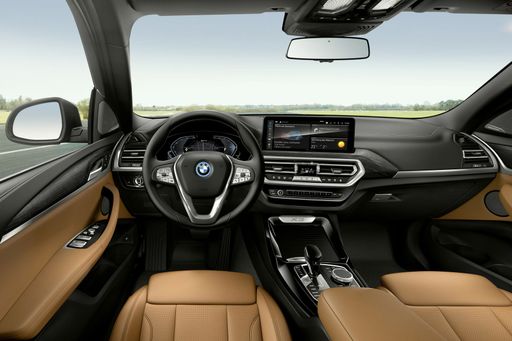 @ press.bmwgroup.com
@ press.bmwgroup.com
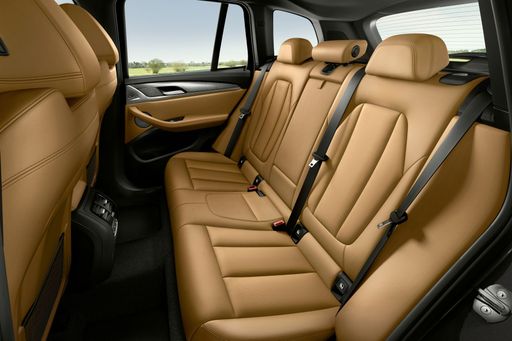 @ press.bmwgroup.com
@ press.bmwgroup.com
A Clash of SUVs: BMW X3 vs. VW Tiguan
In the competitive landscape of compact SUVs, the BMW X3 and VW Tiguan stand as two compelling options, each boasting unique attributes aimed at distinct customer preferences. As consumers become increasingly discerning, the choice between performance, technology, and versatility becomes crucial. This article delves into a detailed comparison of these two titans, exploring their technical aspects and innovative features.
Powertrains and Performance
The BMW X3 offers a robust lineup of powertrains, including Diesel MHEV, Petrol MHEV, Plugin Hybrid, and standard petrol options. Engine choices range from a base power of 190 HP up to an exhilarating 510 HP in the high-performance variant. With zero to 100 km/h acceleration times ranging from an impressive 3.8 seconds to a more moderate 8.4 seconds, the X3 showcases its performance pedigree.
On the flip side, the VW Tiguan features a more modest power range, offering petrol, diesel, and hybrid variants. Power outputs peak at 272 HP with acceleration times from 5.9 seconds to 10.6 seconds, depending on the engine selected. While the Tiguan may not match the X3's top-end performance, its handling and agility make it a commendable option for everyday driving.
Innovative Technology
Both vehicles are equipped with a plethora of tech-savvy features designed to enhance driving experiences. The BMW X3 showcases innovations like the iDrive infotainment system, which integrates navigation, smartphone connectivity, and driver assistance systems seamlessly into the cockpit. The optional Gesture Control adds a touch of futuristic flair, granting drivers the ability to operate certain functions with simple hand movements.
The VW Tiguan, on the other hand, prides itself on its user-friendly interface, benefitting from the latest version of the VW Digital Cockpit. This customizable digital display provides critical driving information and is supplemented by the Discover Pro infotainment system. Additionally, the Tiguan offers an impressive array of safety features, including Adaptive Cruise Control and Emergency Braking, ensuring both convenience and peace of mind.
Design and Comfort
In terms of design, the X3 emanates a premium automotive aura with its muscular stance and signature kidney grille. Inside, it offers a meticulously crafted cabin focused on driver-centric ergonomics. The X3 provides ample legroom and a trunk capacity of up to 570 liters, catering to families and active lifestyles alike.
The VW Tiguan, while slightly smaller, doesn’t compromise on style or space. Its contemporary design and high-quality materials create an inviting atmosphere. The Tiguan boasts an impressive trunk capacity of up to 652 liters, also making it a great choice for those needing extra storage space. Both models comfortably seat five and are designed for long trips or city commutes alike.
Fuel Efficiency
When it comes to fuel consumption, the X3’s petrol variants average around 6 to 7.6 liters per 100 km, while the hybrid models provide additional efficiency, with plug-in options yielding consumption as low as 2.1 liters. These numbers illustrate BMW's commitment to efficiency alongside performance.
Conversely, the Tiguan’s petrol variants range from 5.3 to 7.7 liters per 100 km, with its hybrid variants shining in urban settings. The Tiguan's efficient use of power makes it a practical choice for environmentally conscious consumers.
Conclusion: Which SUV Reigns Supreme?
Ultimately, the choice between the BMW X3 and VW Tiguan boils down to personal preference. The BMW X3 excels in raw power, luxury, and driving dynamics, making it an ideal choice for enthusiasts seeking performance and prestige. Meanwhile, the VW Tiguan offers exceptional value, practical space, and innovative technology, appealing to families and everyday drivers alike.
Both vehicles showcase a commitment to quality, performance, and technology, ensuring that whichever you choose, each journey will be an exciting adventure.

|

|
|
|
|
Kosten und Verbrauch |
|
|---|---|
|
Preis
36900 - 58400 Fr.
|
Preis
57600 - 82200 Fr.
|
|
Verbrauch L/100km
0.4 - 8.5 L
|
Verbrauch L/100km
0.9 - 7.7 L
|
|
Verbrauch kWh/100km
-
|
Verbrauch kWh/100km
-
|
|
Elektrische Reichweite
119 - 129 km
|
Elektrische Reichweite
90 km
|
|
Batteriekapazität
19.70 kWh
|
Batteriekapazität
19.70 kWh
|
|
co2
8 - 193 g/km
|
co2
21 - 175 g/km
|
|
Tankgröße
45 - 58 L
|
Tankgröße
50 - 65 L
|
Maße und Karosserie |
|
|---|---|
|
Karosserie
SUV
|
Karosserie
SUV
|
|
Sitze
5
|
Sitze
5
|
|
Türen
5
|
Türen
5
|
|
Leergewicht
1599 - 1890 kg
|
Leergewicht
1930 - 2140 kg
|
|
Kofferraum
490 - 652 L
|
Kofferraum
460 - 570 L
|
|
Länge
4539 mm
|
Länge
4755 mm
|
|
Breite
1842 - 1859 mm
|
Breite
1920 mm
|
|
Höhe
1656 - 1658 mm
|
Höhe
1660 mm
|
|
Zuladung
460 - 533 kg
|
Zuladung
570 kg
|
Motor und Leistung |
|
|---|---|
|
Motorart
Benzin MHEV, Plugin Hybrid, Diesel, Benzin
|
Motorart
Benzin MHEV, Diesel MHEV, Plugin Hybrid
|
|
Getriebe
Automatik
|
Getriebe
Automatik
|
|
Getriebe Detail
Automat. Schaltgetriebe (Doppelkupplung)
|
Getriebe Detail
Automatikgetriebe
|
|
Antriebsart
Frontantrieb, Allrad
|
Antriebsart
Allrad
|
|
Leistung PS
130 - 272 PS
|
Leistung PS
197 - 398 PS
|
|
Beschleunigung 0-100km/h
5.9 - 10.6 s
|
Beschleunigung 0-100km/h
4.6 - 7.8 s
|
|
max. Geschwindigkeit
198 - 242 km/h
|
max. Geschwindigkeit
215 - 250 km/h
|
|
Drehmoment
220 - 400 Nm
|
Drehmoment
330 - 670 Nm
|
|
Anzahl Zylinder
4
|
Anzahl Zylinder
4 - 6
|
|
Leistung kW
96 - 200 kW
|
Leistung kW
145 - 293 kW
|
|
Hubraum
1498 - 1984 cm3
|
Hubraum
1995 - 2998 cm3
|
Allgemein |
|
|---|---|
|
Modelljahr
2024
|
Modelljahr
2024 - 2025
|
|
CO2-Effizienzklasse
E, B, F, G
|
CO2-Effizienzklasse
F, E, B
|
|
Marke
VW
|
Marke
BMW
|
VW Tiguan
Introducing the VW Tiguan: A Blend of Style and Innovation
The VW Tiguan has consistently been a popular choice among SUV enthusiasts, combining practicality with a touch of elegance. In the latest iteration, Volkswagen has continued this tradition with a range of technical updates and innovations.
Powertrains: Versatility Meets Efficiency
The VW Tiguan comes with a variety of engine options, catering to different preferences and needs. From the efficient petrol mild-hybrid variants to the environmentally friendly plug-in hybrids, and the robust diesel engines, there is something for everyone. The power output ranges from a modest 130 PS to an impressive 272 PS, ensuring that drivers can enjoy a powerful and dynamic driving experience.
Innovation remains at the heart of the Tiguan’s engineering. The plug-in hybrid models, for example, boast an electric range of up to 113 km, making them ideal for those looking to reduce their carbon footprint while still enjoying the flexibility of a traditional engine.
Advanced Transmission and Drivetrain
Equipped with a smooth and responsive automatic transmission, the Tiguan ensures a comfortable drive. The dual-clutch gearbox provides quick and seamless gear changes, enhancing the driving experience. Additionally, the Tiguan is available in both front-wheel and all-wheel drive configurations, offering excellent traction and stability across different driving conditions.
Performance and Efficiency
The Tiguan's performance capabilities are complemented by its efficiency. With fuel consumption as low as 0.4 L/100km for hybrid models, owners can enjoy long trips with fewer stops for refuelling. The CO2 emissions are also impressively low, aligning with modern environmental standards and expectations.
Design and Dimensions
The Tiguan’s aesthetic appeal is undeniable, with a robust character that exudes confidence and sophistication. Its dimensions—4,539mm in length, 1,842 to 1,859 mm in width, and up to 1,658mm in height—provide ample interior space, making it a versatile vehicle for families and adventure seekers alike.
Practicality is further emphasised by its sizeable boot space, ranging from 490 to 652 litres, ensuring plenty of room for luggage or shopping.
Safety and Technology
Volkswagen has not compromised on safety or technology. The Tiguan is equipped with the latest driver assistance systems, ensuring a safe journey for its occupants. Features like adaptive cruise control, lane assist, and emergency braking provide an extra layer of protection.
Pricing and Value
Starting from €38,250 to €59,535, the Tiguan offers a range of specifications and features to match different budgets. When considering the advanced technology, engine options, and the premium feel of the cabin, it presents excellent value for money.
Conclusion: The Ultimate SUV Experience
The VW Tiguan continues to impress with its blend of innovative technology, performance, and practicality. Whether you’re looking for an eco-friendly hybrid with a long electric range or a powerful diesel for longer hauls, the Tiguan provides an all-encompassing solution. With its refined design and superior comfort, it remains a leading choice in the SUV segment.
BMW X3
Introducing the BMW X3: A Blend of Power and Innovation
The BMW X3 is a testament to the brand’s commitment to merging luxury with cutting-edge technology. This SUV not only offers impressive on-road performance but also showcases innovative features that cater to both petrolheads and eco-conscious drivers.
Powerful Performance Across the Range
The BMW X3 comes with various powertrain options to suit diverse driving preferences, ranging from efficient plug-in hybrids to powerful petrol and diesel mild-hybrids. With performance outputs ranging from 184 PS to an impressive 510 PS, the X3 proves its versatility on the road. Paired with BMW's renowned automatic transmission, each model offers a smooth and responsive driving experience complemented by the brand's xDrive all-wheel-drive system.
Leading-Edge Hybrid Technology
Among the X3's portfolio, the plug-in hybrid variants stand out with their optimal balance between efficiency and performance. These models boast electric-only ranges up to 90 km, ideal for urban driving with minimal emissions. Meanwhile, the mild-hybrid systems enhance efficiency by recuperating energy during deceleration and supporting the combustion engine, optimizing fuel consumption ranging from 0.9 L/100km to 10.8 L/100km depending on the model.
Contemporary Design with Practical Features
From a design perspective, the BMW X3 maintains its iconic SUV silhouette, characterized by robust proportions and sleek, aerodynamic lines. With dimensions of up to 4755 mm in length and a luggage capacity of up to 570 litres, it caters to both style enthusiasts and practical users. Additionally, the interior showcases BMW’s commitment to sophistication, featuring high-quality materials, state-of-the-art infotainment systems, and comprehensive driver-assistance technologies.
Efficiency Meets Performance
The X3's impressive performance figures are complemented by its responsible approach to CO2 emissions, aligning with EU efficiency standards. Enhanced by its comprehensive suite of driver aids and intelligent safety features, the X3 ensures both the thrill of driving and peace of mind.
Conclusion: The Ultimate Driving Companion
In essence, the BMW X3 represents the perfect intersection of dynamic performance, fuel efficiency, and modern-day technology. With options catering to diverse needs and preferences, it remains a leading choice for drivers seeking versatility, innovation, and luxury.
Die angezeigten Preise und Daten sind Schätzungen, die auf deutschen Listenpreisen basieren, und können je nach Land variieren. Diese Informationen sind rechtlich nicht bindend.
